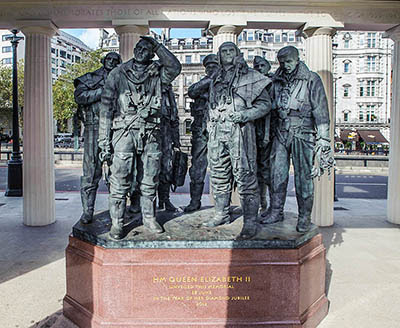The Crew is Now Complete
In early November 1944, the crew was moved to 1662 Heavy Conversion Unit at 71 Base, RAF Blyton and on November 7th, flight engineer, Kenneth Smith joined the crew.
RAF Volunteer Reserve Sergeant Kenneth John Boucher Smith was born in 1924 in England, and at 20 years old, was the crew’s Engineer.
Harris wrote home that day about the crew’s new addition: “Today I have acquired another member of our team, and on first sight I am very pleased with him. He is English, with the undistinguished name of Smith, about 22 years old, and looks to be a natural-born engineer.”
In the same letter, Harris wrote to Margaret that he was quite pleased with the food at RAF Blyton. Immediately after arriving he received a ration of six oranges and noted apples and pears were plentiful. In a letter written November 21, 1944, Harris elaborated: “We do quite well here, in my opinion. We get an egg for breakfast every other day or so, and bacon just as frequently, a glass of milk at tea time, and always cheese at dinner and jam for breakfast and tea. We have a hot dinner and usually a hot supper too, and I really think I eat more here than in Canada.”
By November 22nd, the crew resumed training, completing two weeks of training now on Halifaxes.
The Halifax bomber began service with the RAF in November 1940 and quickly became a major component of the Allies strategic bombing missions, many at night. While considered inferior to the Lancaster in terms of its inability to carry large bomb loads, their production continued through to April 1945. In addition to bombing, the aircraft were also used for training, troop transport and paratrooper drop operations.
RAF Volunteer Reserve Sergeant Kenneth John Boucher Smith was born in 1924 in England, and at 20 years old, was the crew’s Engineer.
Harris wrote home that day about the crew’s new addition: “Today I have acquired another member of our team, and on first sight I am very pleased with him. He is English, with the undistinguished name of Smith, about 22 years old, and looks to be a natural-born engineer.”
In the same letter, Harris wrote to Margaret that he was quite pleased with the food at RAF Blyton. Immediately after arriving he received a ration of six oranges and noted apples and pears were plentiful. In a letter written November 21, 1944, Harris elaborated: “We do quite well here, in my opinion. We get an egg for breakfast every other day or so, and bacon just as frequently, a glass of milk at tea time, and always cheese at dinner and jam for breakfast and tea. We have a hot dinner and usually a hot supper too, and I really think I eat more here than in Canada.”
By November 22nd, the crew resumed training, completing two weeks of training now on Halifaxes.
 |
| The Halifax Source: The Bomber Command Museum of Canada |


Comments
Post a Comment